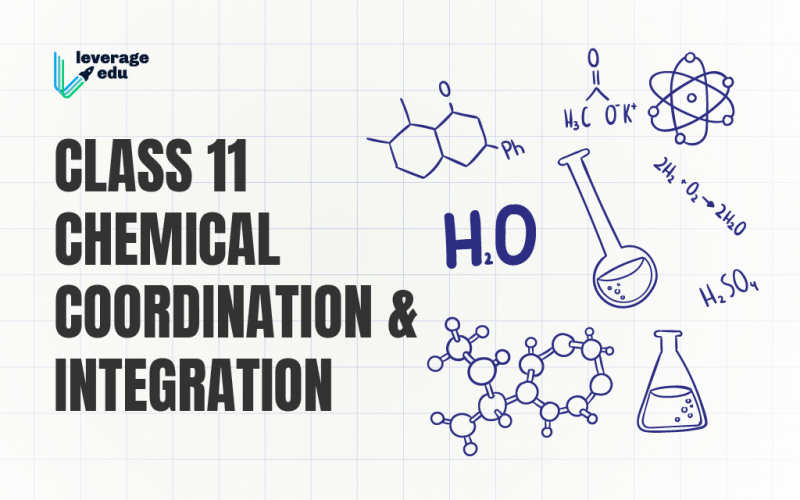Biology is one of the most popular subjects in the science stream. Our PCB students must know that the chemical coordination and integration are primarily done by the endocrine glands present in our human bodies. The endocrine glands are solely responsible for secreting hormones in males and females regulating and performing different body functions. In this blog, we shall be covering all the important points related to the chapter of class 11 Chemical coordination and integration, which is a scoring chapter in class 11 biology syllabus. So get ready with a notebook in hand and a pen and read this blog till the end.
This Blog Includes:
Must Read: NCERT Biology Class 11
The Human Endocrine System
The class 11 Chemical coordination and integration talks about the human endocrine system. The endocrine system is quite complex and advanced in the animal kingdom’s human kingdom if we compare it with those invertebrates. Having said that, the endocrine system in human beings comprises several ductless glands. These ductless glands regulate the functions of our body and also evoke specific responses too. These endocrine glands secrete hormones directly into our blood and help control and perform different body functions.
Properties of Hormones
According to the chapter of class 11 chemical coordination and integration, listed below are some of the vital functions or properties of hormones that are secreted by the endocrine glands in our body.
- These hormones are released by the endocrine glands located at different places inside our body as you can see in the above picture.
- The hormones that are secreted by the endocrine system or endocrine glands are released directly into the blood.
- These hormones are generally short-lived.
- They also do not contain antigens.
- The hormones that are secreted by different endocrine glands of our body help coordinate various physical and metabolic activities.
- It also helps in maintaining homeostasis.
- Our bodies require these hormones in deficient concentrations.
- Some hormones like insulin secreted by pancreas and adrenaline, secreted by the adrenal glands act quickly.
- Few hormones like proinsulin are known to be secreted in an inactive form or state. Hence these are known as prohormones.
- Always remember that hormones are specific and are carried to a specific target organ.
The Classification of Hormones
According to the chapter of class 11 chemical coordination and integration, hormones can be classified into 2 categories:
- Lipid soluble hormones– These hormones comprise thyroid and steroid hormones
- Water-soluble hormones– These hormones include peptide, protein and amine hormones
Endocrine Glands and their Hormones
Next in class 11 Chemical coordination and integration we discuss the endocrine glands and their hormones. The important points are tabulated below.
| Name of Endocrine Glands | Hormones Secreted |
| Posterior Pituitary | Adrenocorticotropic hormone |
| Anterior Pituitary | Oxytocin |
| Pineal Gland | Melatonin |
| Thyroid Gland | Thyroxine |
| Adrenal Gland | Adrenalin and Cortisol |
| Ovaries | Estrogen, Progesterone |
| Testes | Testosterone |
Functions of Endocrine Glands
According to the chapter of class 11 chemical coordination and integration, these are the pivotal functions of the endocrine glands that are present in any human body.
| Endocrine Glands | Function |
| Hypothalamus | The hypothalamus is known to regulate thirst, body temperature, hunger, sleep emotions, moods and allows the release of other hormones. |
| Thymus | The thymus gland helps the adaptive immune system to function properly and produces T-cells. |
| Pineal | It develops serotonin derivatives of melatonin that can affect sleep |
| Parathyroid | It regulates calcium levels in the body |
| Pituitary | The pituitary gland is known as the master gland as it controls other glands. It also triggers growth and development. |
| Thyroid | The hormones produced by the thyroid gland affect the heart rate |
| Adrenal | The hormones secreted by adrenal gland regulate cortisol and stress hormone. |
| Pancreas | The primary function of the pancreas is to secrete insulin which is a crucial hormone to maintain blood sugar levels |
| Ovaries | The ovaries are responsible to secrete estrogen, progesterone and other female sex hormones. |
| Testes | The primary function of testes in males is to secrete the male sex hormone, testosterone and produces sperm. |
Functions of Hormones
According to the chapter of class 11 chemical coordination and integration, the important functions of hormones are as follows:
- They contribute to the regulation of the growth and development of the body.
- They maintain the body’s homoeostasis.
- Initiation of sexual development and reproduction.
- Controls, appetite and thirst.
- Helps in food metabolism.
Explore: Structural Organisation in Animals Class 11 Notes
This brings us to the end of this blog on the chapter of class 11 chemical coordination and integration. We hope that these study and revision notes will prove out to be helpful for that last-minute revision before exams and also help you score more. For more such amazing reads and important revision and study notes related to any a plethora subjects of different classes, stay tuned with Leverage Edu.

 One app for all your study abroad needs
One app for all your study abroad needs





















 45,000+ students realised their study abroad dream with us. Take the first step today.
45,000+ students realised their study abroad dream with us. Take the first step today.

